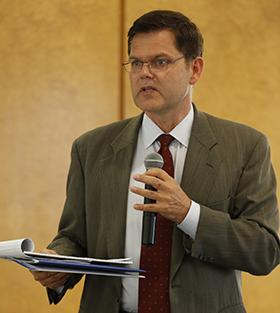Professor Curtis J. Milhaupt 89 Explores State Economic Intervention in Asia and the U.S.
Leading Scholar on the Legal Systems of East Asia Contrasts Varying Approaches to Balancing Government and Private Enterprise.
New York, November 19, 2013—The governments of China, Japan, and the United States intervene in the marketplace in different ways that continue to evolve, explained Columbia Law School Professor Curtis J. Milhaupt ’89, a distinguished scholar in the field of comparative law, at two recent and related events.
Milhaupt—the Parker Professor of Comparative Corporate Law, Fuyo Professor of Japanese Law, director of the Parker School of Foreign and Comparative Law and director of the Center for Japanese Legal Studies—participated in an Oct. 2 conference, State Intervention and Private Enterprise: Japan, the U.S. and China, and delivered a Nov. 4 presentation, Beyond Ownership: State Capitalism and the Chinese Firm, both at Columbia University.
| Professor Curtis J. Milhaupt '89 |
The conference—co-hosted by the Center for Japanese Legal Studies, the Center on Japanese Economy and Business (CJEB) at Columbia Business School and the Japan Economic Foundation (JEF)—convened top experts to examine how China, Japan, and the U.S. use state power to impact private enterprise.
Conference participants included Christopher J. Mayer, Paul Milstein Professor of Real Estate at Columbia Business School and co-director of the Richard Paul Richman Center for Business, Law, and Public Policy; Merit E. Janow, dean of Columbia’s School of International and Public Affairs; Hugh Patrick, R.D. Calkins Professor of International Business Emeritus and director of CJEB; Yasheng Huang, of MIT’s Sloan School of Management; Gary Clyde Hufbauer, Reginald Jones Senior Fellow at the Peterson Institute for International Economics; and Sota Kato, professor at the International University of Japan and senior fellow at the Tokyo Foundation.
In a series of probing conversations, conference speakers suggested that China practices a form of state capitalism that has achieved massive growth but concentrated benefits to a small cadre of insiders; that Japan has been fitfully transitioning from an old-fashioned industrial policy to a more market-conforming model; and that the U.S. has generally been moving away from interventionism in the market, but with major exceptions during crises and for specialized cases like health insurance and housing finance.
At Milhaupt’s November presentation on China, he delved into the complex distinctions between the country’s state-owned and privately owned corporations and argued that prevailing assumptions—and bodies of law—regarding the differences may be misplaced. Rather, Milhaupt suggested, the Chinese government asserts more control over privately owned corporations than commonly assumed because top private executives have extensive connections to the government, are subject to much informal regulation, and receive massive subsidies. By contrast, government control over state-owned enterprises is less absolute than many imagine.
Ultimately, both state and privately owned corporations compete for influence and favor with the government, Milhaupt said, by attempting to capture the privileges, or “rents,” created by governmental intervention in the economy. With Chinese political leaders’ focus on economic growth, firms capture rents by demonstrating their growth potential, he said.
These realities have major implications for domestic and international law, Milhaupt argued. For example, bribing an employee of a state-owned enterprise is a violation of the U.S. Foreign Corrupt Practices Act, but bribing an employee of a foreign private company is not. If private companies hold equal amounts of influence with the government, this distinction makes very little sense, he said.
Conference participants included Christopher J. Mayer, Paul Milstein Professor of Real Estate at Columbia Business School and co-director of the Richard Paul Richman Center for Business, Law, and Public Policy; Merit E. Janow, dean of Columbia’s School of International and Public Affairs; Hugh Patrick, R.D. Calkins Professor of International Business Emeritus and director of CJEB; Yasheng Huang, of MIT’s Sloan School of Management; Gary Clyde Hufbauer, Reginald Jones Senior Fellow at the Peterson Institute for International Economics; and Sota Kato, professor at the International University of Japan and senior fellow at the Tokyo Foundation.
In a series of probing conversations, conference speakers suggested that China practices a form of state capitalism that has achieved massive growth but concentrated benefits to a small cadre of insiders; that Japan has been fitfully transitioning from an old-fashioned industrial policy to a more market-conforming model; and that the U.S. has generally been moving away from interventionism in the market, but with major exceptions during crises and for specialized cases like health insurance and housing finance.
At Milhaupt’s November presentation on China, he delved into the complex distinctions between the country’s state-owned and privately owned corporations and argued that prevailing assumptions—and bodies of law—regarding the differences may be misplaced. Rather, Milhaupt suggested, the Chinese government asserts more control over privately owned corporations than commonly assumed because top private executives have extensive connections to the government, are subject to much informal regulation, and receive massive subsidies. By contrast, government control over state-owned enterprises is less absolute than many imagine.
Ultimately, both state and privately owned corporations compete for influence and favor with the government, Milhaupt said, by attempting to capture the privileges, or “rents,” created by governmental intervention in the economy. With Chinese political leaders’ focus on economic growth, firms capture rents by demonstrating their growth potential, he said.
These realities have major implications for domestic and international law, Milhaupt argued. For example, bribing an employee of a state-owned enterprise is a violation of the U.S. Foreign Corrupt Practices Act, but bribing an employee of a foreign private company is not. If private companies hold equal amounts of influence with the government, this distinction makes very little sense, he said.
Prior to entering academia, Milhaupt practiced corporate law in New York and Tokyo. He also conducted graduate studies in law and international relations at the University of Tokyo.
